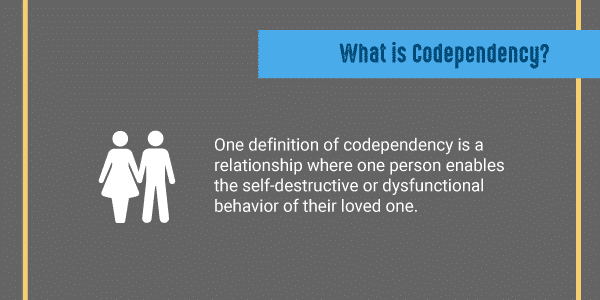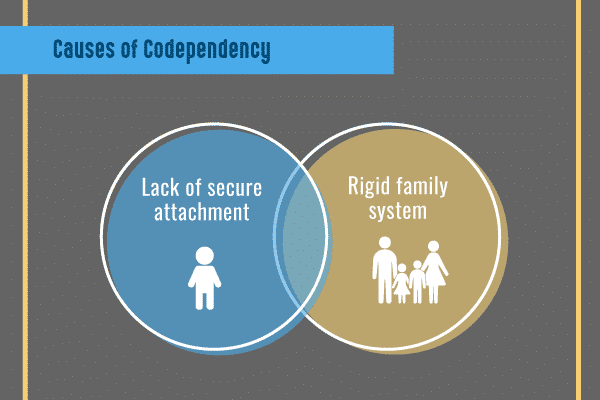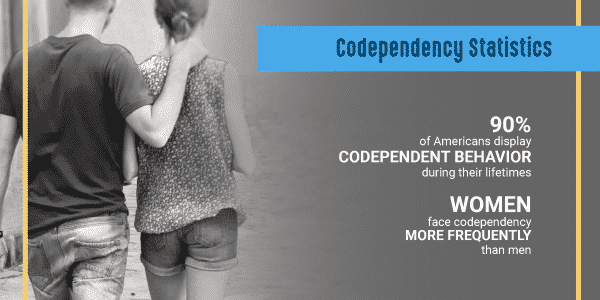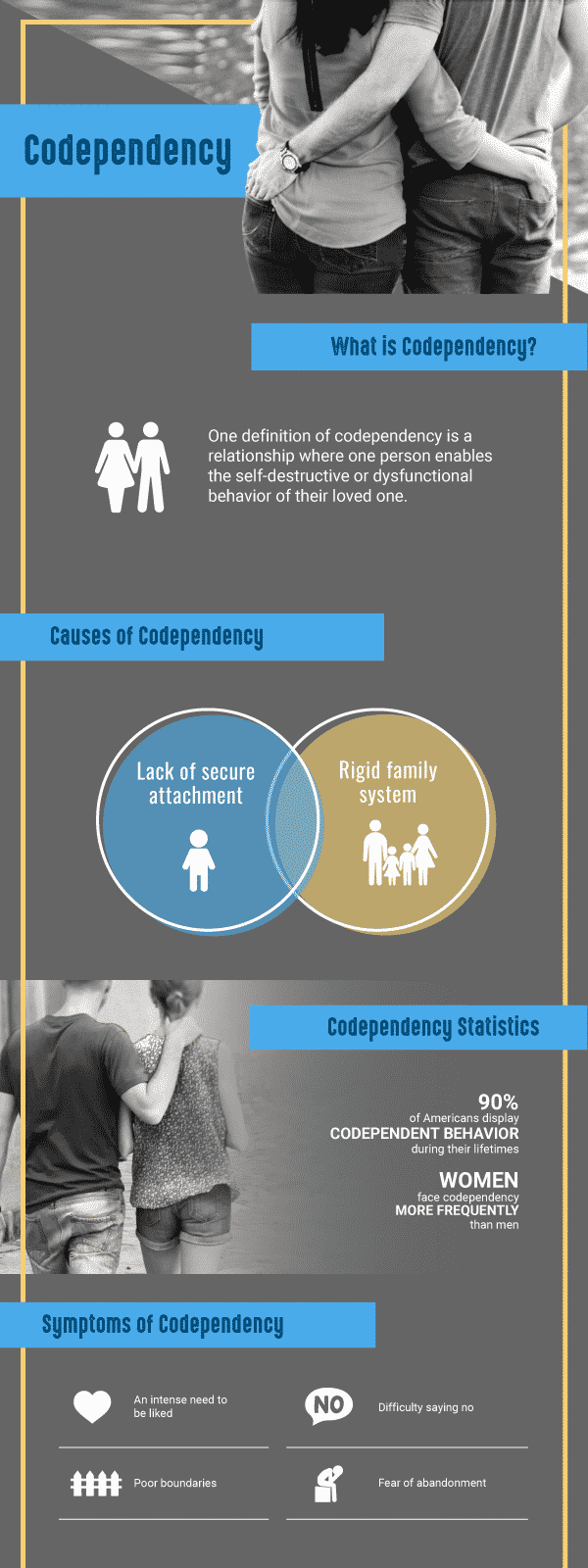Codependency has many symptoms, causes and risk factors. Learn more about this condition through this page.
People who are codependent often assume a caretaker role in their relationships. Codependent individuals may put their partner or loved one’s needs ahead of their own, and they usually feel fulfilled in feeling needed by another person.
What Is Codependency?
Onedefinition of codependencyis a relationship where one person enables the self-destructive or dysfunctional behavior of their loved one. Compelled by the overwhelming desire for approval and fear of rejection, the codependent person seeks to satisfy their loved one’s needs in counterproductive ways, sacrificing their own needs and desires in the process.
People who struggle with codependency may overextend themselves to meet their loved one’s needs, whether the needs are legitimate or not. This behavior hinders the well-being of both the codependent person and the person they’re trying to help.

Signs and Symptoms of Codependency
What does codependency look like? Some commoncodependency symptomsinclude:
[elementor-template id="4848"]- Low self-esteem
- Familial dysfunction
- Depression
- Anxiety
- Stress
- Low emotional clarity
Othersigns of codependencymay include:
- An intense need to be liked
- Ruminating on mistakes
- Difficulty saying no
- Difficulty with honesty
- A compulsion to take care of other people
- Poor boundaries and intimacy issues
- A need for control over loved ones
- A desire to always be in a relationship
- Denying one’s own needs, thoughts and feelings
- Confusing love and pity
- Fear of abandonment
Recognizing the Signs of a Codependent Relationship
If you are uncertain if you’re in a codependent relationship, there are a few questions that may serve as a guide. The following questions may help you understandhow to tell if you’re in a codependent relationship:
- Do you make extreme sacrifices to your life in order to satisfy your partner’s needs?
- Is it difficult to say no when your partner makes demands on your time and energy?
- Do you make excuses for your partner’s problems with drugs, alcohol or the law?
- Are you constantly worried about other people’s opinion of you?
- Do you feel trapped in your relationship?
- Do you keep quiet to avoid arguments?
What Causes Codependency?
When parents lack the skills to provide a secure attachment the child may assume that their relationship if normal. If a parent fails to provide a nurturing environment at home, the child may assume the role of caretaker. They may also learn that people who say they love them may harm them, instead. Because of this fact, the child may become a people pleaser who struggles with boundaries and feelings of unworthiness.

Codependency Statistics
Unfortunately, not manycodependent relationship statisticsexist. Currently,codependency statisticsinclude:
- Some estimates guess that more than90 percent of Americansdisplay codependent behavior during their lifetimes
- 96 percent of Americansstruggle with some form of codependency, cited a 1990 article in The New York Times
- Approximately40 million Americansstruggle with codependency, according to a 1998 study
- Women face codependencymore frequentlythan men

Risk Factors for Codependency
Sometimes compulsive caretaking behavior can cause certain risk factors for codependency to develop or strengthen. Nevertheless, these factors unintentionally influence the development of theaddictionand the cycle must be broken for the family system to be supportive of a lasting recovery.
These factors are characteristic of an unhealthy family system:
- A rigid family system that does not allow people to function outside of their respective roles
- Inconsistent family structure due to the nature of addiction
- Erratic behavior by the addicted person results in instability within the entire system
- Impulsive decision-making based on a reaction rather than a proactive course of rational action
Codependency and Substance Abuse
Studies on alcoholism and interpersonal relationshipsreveal the connection between substance abuse and codependency. A strong link has been shown between alcoholic parents and adult children who behave in a codependent manner. Often, people in this situation grow up and marrypartners who also abuse alcoholor other drugs.
A codependent person working to overcome substance abuse needssupport from friends and family. However, it is important that this support involvesboundariesto reduce the risk of relapse. People who struggle with enabling behaviors or codependency are not able to appropriately moderate their emotions and boundaries, and this can be detrimental to the recovery process. Support and treatment for both codependency and substance abuse simultaneously is the best path to recovery.
Coping With a Codependent Loved One
Understanding why someone develops a codependency issue is a good way to deal with the problem effectively. Codependent relationships can be highly dysfunctional, in which one person supports or enables another person’s problems. These problems can be related tomental health, irresponsibility or addiction.
The best action someone can take for a codependent loved one is to research the disorder to better understand that it isn’t their job to cure the codependent loved one. Establishing boundaries while still encouraging treatment may be a challenge. Seeking help from anaccredited treatment facilitycan assist with this process.
Treatment for Codependency
Overcoming codependency may require professional help.Codependency treatmentcan start with:
- Speaking with a licensed mental health practitioner
- Enrolling in counseling with a therapist
- Reading self-help books about codependency
- Talking with trusted friends and family members about codependent relationships
The Recovery Village simultaneously treats co-occurring disorders, including those involving co-dependency and addiction. With locations across the United States, The Recovery Village provides a safe and secure environment for people to heal. Each treatment plan is catered to the patient’s specific needs. If you or a loved one struggles with drug or alcohol abuse and a codependency disorder,call The Recovery Villageto speak with a representative.

